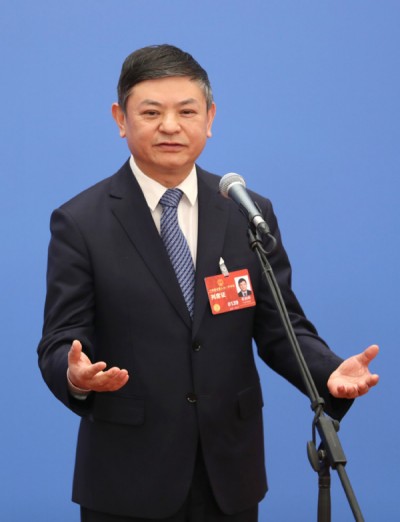Global biodiversity framework a milestone, COP15 head says

Huang Runqiu, a member of the 14th National Committee of the Chinese People's Political Consultative Conference (CPPCC) and minister of ecology and environment, takes a question from the press at the ministers' passage interviews during the ongoing two sessions in Beijing on Sunday. [Photo by Zou Hong/chinadaily.com.cn]
The global biodiversity framework adopted at COP15 United Nations biodiversity conference late last year and its supporting policies are of milestone significance for the world, said COP15 President Huang Runqiu.
Huang, also minister of ecology and environment, made the remarks at the Great Hall of the People in Beijing on Sunday after the opening meeting of the first session of the 14th National People's Congress.
COP15, formally known as the 15th meeting of the Conference of the Parties to the UN Convention on Biological Diversity, was held in two phases. The first part of it was held in Kunming, capital of Yunnan province, in October 2021, which included an opening ceremony, leaders' speeches and the issuance of the "Kunming Declaration". Parties then gathered for negotiations in Montreal, Canada, in December.
The minister highlighted a fund mechanism that demands financial flows from developed nations to support biodiversity conservation in developing countries and Digital Sequence Information, or DSI, as two of the key mechanisms adopted in Montreal.
"Parties conquered great difficulties to adopt these mechanisms. But once put into practice, they are expected to help achieve significant results," he said.
DSI, a dominant topic at COP15, has many commercial and non-commercial applications, including pharmaceutical product development, improved crop breeding, and the monitoring of invasive species.
Delegates have agreed to establish a multilateral fund within the framework for the equitable sharing of benefits between providers and users of DSI, to be finalized at COP16 in Turkiye in 2024.
The adaptation of the framework and its supporting policies have mapped a blueprint, identified targets and pathways for global biodiversity governance, he said.
"This is the first time that China successfully led and promoted negotiations over key UN environmental topics as presidency," he stressed.
Huang also mentioned a red line system as one of the Chinese mechanisms that are instructive for the world.
Unique to China, the system aims to encircle areas with key ecological functions, important and fragile ecosystems into red lines that cannot be crossed. He said the system has now brought about 30 percent of the country's land territory under protection.
He said the country has rolled out 44 national projects that aim to enhance systematic governance of mountains, rivers, forests, farmlands, lakes, grasslands and deserts, as well as a series of environmental restoration programs in mines.
In many cities across the country, local governments have ramped up their efforts to remediate black and odorous water bodies, improve water environment quality and restore water ecosystems.
Thanks to the efforts, many rivers have seen their water become lucid and banks green. These water bodies have been transformed into locations for people to enjoy leisure, he said.
With these measures, China has managed to achieve synergy between ecological and environmental protection and economic development, he said.









